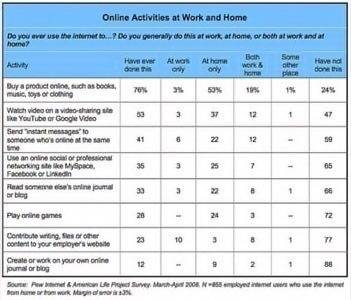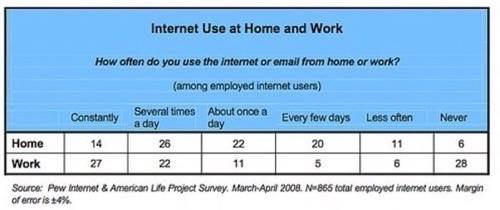The Pew Internet and American Life Project, always a source of fascinating survey results, has come out with a new one about technology and work. The latest is titled “Networked Workers: Most workers use the internet or email at their jobs, but they say these technologies are a mixed blessing for them.”

The gist of the analysis is that people who use the internet at work also use it to do work at home; it makes them more efficient but also increases the demands on their time. Any of us who live that kind of life could have told you that – but what we find more interesting is the surprisingly low number of people who say they use certain technologies at work.
Greg Sterling at the excellent blog SearchEngineLand pulls out some of the most salient data points from the survey and we’ll excerpt further from his post below. We question both the definition of “networked worker” in the survey and Sterling’s perspective on it, though.
Specifically, the Pew study focuses on “networked workers” – defined as anyone who uses the internet or email at their work. At all. Can you guess what percentage of employed US adults say they use the internet or email at their work? Only 62%. Even that number includes people who make only the most rudimentary use of the most simple tools, however. A look at the details indicates that anything beyond the simplest tools (like the browser) is still a real fringe case.

The big take-aways from the above for us? That only 18% of people who use the internet at work use IM, only 10% report using social networks like Facebook, LInkedIn or MySpace and a mere 11% report reading blogs at work.
Only 1 out of 10 people who use the internet at work read blogs about their work; that seems like a real loss of opportunity for them.
If you or someone you love falls outside of these categories – please take our word for it – those are really useful tools! You can communicate really well (instantly, in fact) using IM and there’s a whole lot of valuable information on blogs in any field. As for social networks, you’ll see the value in those after you get comfortable with IM and blogs.
If you use the internet every day at work but never use IM and never read blogs on your field, you’re not really using the internet – or you may as well not be. There’s no shame in that, but that’s how it is. To be fair, the 60% of respondents who use the internet at work probably includes a lot of people who feel pretty advanced for doing so at all after years of working without it.
Combine these numbers, though, with another reputable survey from last year that found that 11% of US respondents “said they were very or somewhat likely to…implant a device into your brain that enabled you to use your mind to access the internet if it could be done safely.” An internet brain implant is a terrible idea, but they should definitely not be given to anyone who’s never read a blog at work.

It’s even crazier when you look at the chart above. Add the left-most numbers in this chart up and you’ll see that 60% of these people use the internet at least once every day at work. But they don’t read blogs, use IM or find contacts, answers or other resources on social networks.
Greg Sterling at SearchEngineLand says these numbers are probably low because people don’t report accurately how much they use these tools at work – but Pew studies are really well done, they are anonymous and there’s no reason to think them inaccurate as far as we can tell.
What Does it All Mean?
The survey and some early analysis of this survey point to the encroachment of work machines into our personal lives. As professional internet users, we’d point instead to the apparently huge gap between early adopter activities and the rest of the “networked world.”
This is why Common Craft can make an entire business out of licensing 5 minute videos of stick figures explaining how Google Reader and LInkedIn work. That stuff is like a bright beam of light breaking through the clouds of the modern workplace. It’s an important light to look at, too. Though business can clearly be done without meaningful use of the internet (obviously) – competition will likely only grow more intense.
As geek photographer and friend of RWW Aaron Hockley said on Twitter this morning “Social media search feeds. If you’re not using them, you’re losing business to someone who is.” Those who are using them have lots of business to take, too, because almost 90% of people in the US who use the internet at work aren’t even reading blogs.










